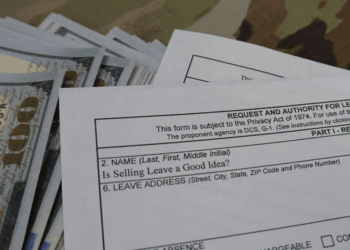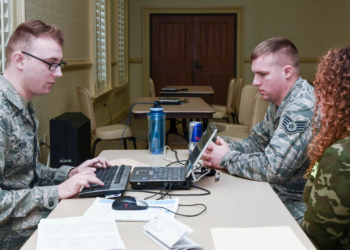It’s stressful getting to the end of the month and being completely out of money! When you’re stressed out about money, it’s impossible to concentrate on anything else. That’s a problem.
No shame or blame though. We’ve resorted to putting rent on a credit card before (bad idea!). Luckily, service members have tons of resources and programs to help break the cycle of living paycheck to paycheck.
Build spending awareness
First, you have to track what you’re spending. A budget (yeah, I said it) is the best way to track your money. You can call it a spending plan or cashflow plan, but you need to know where your hard-earned money is going.
However, I’m not talking about a half-hearted budget full of pretty, round numbers (guesses) – I want the facts! Whether you use a budgeting app, Google form, or a notebook, find a system you’ll actually use.
Without accurate information, you could be spending money and not even know it (those subscriptions you forgot about). There could also be fraudulent charges. Track every cent until you understand your spending. Until you know where your money is going, you can’t fix it.
Ultimately, you really only have a couple options – earn more or spend less.
Option one: Earn more
Research the Joint Ethics Regulations and unit-specific policies first. The mission always comes first, and you can’t solicit (sell to) your teammates. Also, beware of multi-level marketing (MLM) gigs. They’re often “paying” you with their products or “special” discounts. You need actual money, not more stuff to sell.
There are plenty of “gig economy” jobs like delivering food or rideshares. Just know, you’ll often get paid as a contractor (1099) and you’re responsible for paying taxes on your earnings.
Also, don’t overlook working toward promotions. Improving your physical fitness or working on your degree costs you nothing but your time.
Option two: Cut spending
Although less fun, cutting spending is often the best choice. Military life is hectic enough without adding a second job. It does you no good to make more money if you’re not controlling spending.
Just like we’re taught in first-aid, bleeding (spending) is a major issue and must be controlled. You might not need a “tourniquet” per se, but applying pressure on some spending categories might be needed.
Cooking at home, food drops, or meal planning can help reduce your grocery bills. If you’re going out a lot or driving a more expensive car than you can afford, you may need some lifestyle changes. Think carefully about what’s really important and cut spending on anything that doesn’t truly improve your life.
Don’t make things worse
Please don’t turn to payday loans, “buy now-pay later,” or credit cards. These only make things worse – a lot worse! Trust me, these companies aren’t helping anyone but themselves. Stay away!
Don’t hesitate to get help
You have free access to Personal Financial Counselors. Visit the DOD Financial Readiness (FINRED) or Military OneSource websites to find one. They’re a great resource for financial issues. They’re trained financial counselors with one mission – helping you.
Also, don’t forget about the relief societies either – the Army Emergency Relief, Navy-Marine Corps Relief Society, Air Force Aid Society, or Coast Guard Mutual Assistance. They each have their own requirements and funding, but they can offer counseling, education, grants, and zero-interest loans.
You can do this!
No matter where you are financially, you can improve where you are. Use your resources to make this the year you break the cycle of living paycheck to paycheck!









































